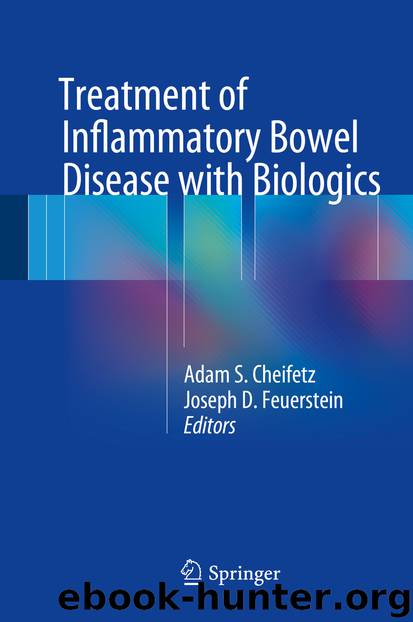Treatment of Inflammatory Bowel Disease with Biologics by Adam S. Cheifetz & Joseph D. Feuerstein

Author:Adam S. Cheifetz & Joseph D. Feuerstein
Language: eng
Format: epub
Publisher: Springer International Publishing, Cham
Infliximab for Pediatric Ulcerative Colitis
Infliximab was FDA approved for the treatment of moderate to severe p ediatric ulcerative colitis in 2011; however, similar to pediatric CD, this medication was used off-label for pediatric patients with refractory colitis for several years prior to approval based on adult data and smaller pediatric case series demonstrating efficacy of this therapy. A preliminary case series by Mamula et al. showed that seven of nine patients (77%) with moderate to severe UC that was refractory to traditional therapy had a clinical response to infliximab as measured by the PGA, with six of these patients having inactive disease 2 weeks after the infusion [19]. A steroid-sparing effect was seen and 66% of these patients were able to discontinue corticosteroid therapy. Nine patients in this cohort were reevaluated after a minimum of 2 years of follow-up, and 73% of these patients were considered to be responders to the initial dose [20]. Two of these patients lost response within 9 months, and the remaining five responders had a sustained response, three of whom were doing well without ongoing infliximab therapy. A clinical response rate of 88% was seen in an additional eight patients with refractory UC treated with infliximab [20]. In total, 14 of 17 patients (82%) developed a short-term response, and 10 patients (63%) developed a long-term response to infliximab therapy. Another retrospective single-center study evaluated the response to infliximab in 12 pediatric patients with UC, 3 with fulminant colitis, 3 with an acute relapse of disease, 5 with steroid-dependent colitis, and 1 with corticosteroid-refractory colitis [21]. Nine patients (75%) developed a complete short-term response, two had a partial response, and eight patients had a long-term response to infliximab (median follow-up 10.4 months). In this small study, long-term response to infliximab therapy was more likely in patients who were receiving concomitant mercaptopurine. A larger single-center retrospective series by McGinnis et al. evaluated the short- and long-term response to infliximab induction in 40 pediatric UC patients with steroid-dependent or steroid-resistant disease [22]. Twenty-eight patients (70%) had a clinical response to infliximab, including 9 of 12 patients with steroid-dependent disease and 18 or 27 with steroid-refractory disease. Over the study period, 20% of responders had undergone colectomy compared to 82% of nonresponders. A multicenter cohort, inception cohort study of 332 pediatric patients with UC prospectively evaluated outcomes of 52 patients who received continuous maintenance therap y or episodic treatment with infliximab [23]. Approximately 35% of these patients had corticosteroid-free inactive or mild disease at 3-, 6-, 12-, and 24-month assessments, and 61% were colectomy-free at 24 months. Looking at the subset of patients receiving continuous maintenance therapy, approximately 50% of the patients had inactive or mild disease across these time points, and the likelihood of being colectomy-free was 74% at 24 months, suggesting additional benefit on maintenance dosing. These remission rates were lower than previously reported; however, 50% of this cohort was hospitalized at initiation of infliximab, perhaps suggesting more severe or chronic disease.
Patients with chronic ulcerative colitis refractory
Download
This site does not store any files on its server. We only index and link to content provided by other sites. Please contact the content providers to delete copyright contents if any and email us, we'll remove relevant links or contents immediately.
| Administration & Medicine Economics | Allied Health Professions |
| Basic Sciences | Dentistry |
| History | Medical Informatics |
| Medicine | Nursing |
| Pharmacology | Psychology |
| Research | Veterinary Medicine |
Periodization Training for Sports by Tudor Bompa(8254)
Why We Sleep: Unlocking the Power of Sleep and Dreams by Matthew Walker(6706)
Paper Towns by Green John(5179)
The Immortal Life of Henrietta Lacks by Rebecca Skloot(4579)
The Sports Rules Book by Human Kinetics(4379)
Dynamic Alignment Through Imagery by Eric Franklin(4208)
ACSM's Complete Guide to Fitness & Health by ACSM(4057)
Kaplan MCAT Organic Chemistry Review: Created for MCAT 2015 (Kaplan Test Prep) by Kaplan(4008)
Introduction to Kinesiology by Shirl J. Hoffman(3766)
Livewired by David Eagleman(3765)
The Death of the Heart by Elizabeth Bowen(3610)
The River of Consciousness by Oliver Sacks(3599)
Alchemy and Alchemists by C. J. S. Thompson(3516)
Bad Pharma by Ben Goldacre(3422)
Descartes' Error by Antonio Damasio(3271)
The Emperor of All Maladies: A Biography of Cancer by Siddhartha Mukherjee(3155)
The Gene: An Intimate History by Siddhartha Mukherjee(3094)
The Fate of Rome: Climate, Disease, and the End of an Empire (The Princeton History of the Ancient World) by Kyle Harper(3055)
Kaplan MCAT Behavioral Sciences Review: Created for MCAT 2015 (Kaplan Test Prep) by Kaplan(2984)
